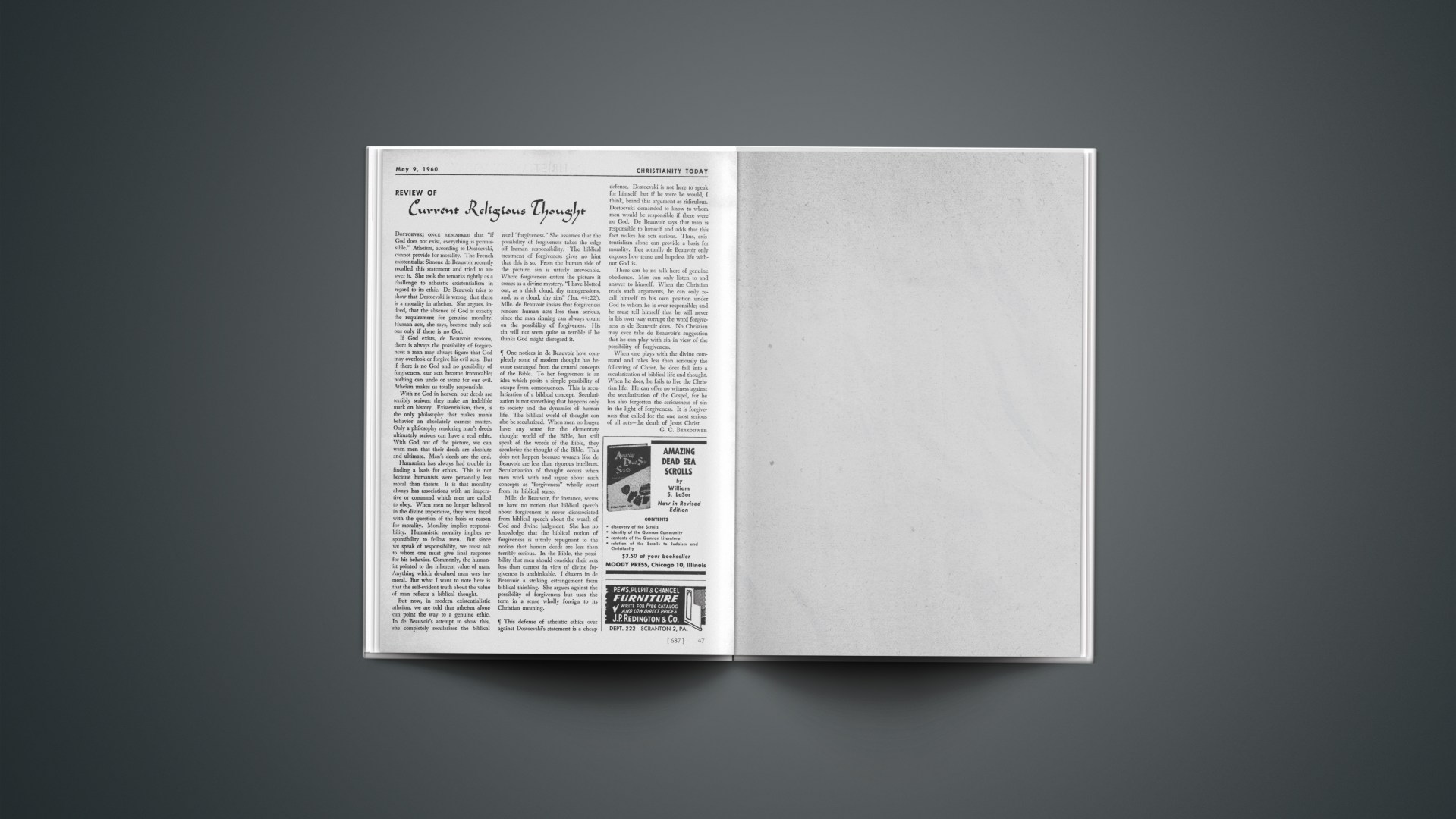Dostoevski once remarked that “if God does not exist, everything is permissible.” Atheism, according to Dostoevski, cannot provide for morality. The French existentialist Simone de Beauvoir recently recalled this statement and tried to answer it. She took the remarks rightly as a challenge to atheistic existentialism in regard to its ethic. De Beauvoir tries to show that Dostoevski is wrong, that there is a morality in atheism. She argues, indeed, that the absence of God is exactly the requirement for genuine morality. Human acts, she says, become truly serious only if there is no God.
If God exists, de Beauvoir reasons, there is always the possibility of forgiveness; a man may always figure that God may overlook or forgive his evil acts. But if there is no God and no possibility of forgiveness, our acts become irrevocable; nothing can undo or atone for our evil. Atheism makes us totally responsible.
With no God in heaven, our deeds are terribly serious; they make an indelible mark on history. Existentialism, then, is the only philosophy that makes man’s behavior an absolutely earnest matter. Only a philosophy rendering man’s deeds ultimately serious can have a real ethic. With God out of the picture, we can warn men that their deeds are absolute and ultimate. Man’s deeds are the end.
Humanism has always had trouble in finding a basis for ethics. This is not because humanists were personally less moral than theists. It is that morality always has associations with an imperative or command which men are called to obey. When men no longer believed in the divine imperative, they were faced with the question of the basis or reason for morality. Morality implies responsibility. Humanistic morality implies responsibility to fellow men. But since we speak of responsibility, we must ask to whom one must give final response for his behavior. Commonly, the humanist pointed to the inherent value of man. Anything which devalued man was immoral. But what I want to note here is that the self-evident truth about the value of man reflects a biblical thought.
But now, in modern existentialistic atheism, we are told that atheism alone can point the way to a genuine ethic. In de Beauvoir’s attempt to show this, she completely secularizes the biblical word “forgiveness.” She assumes that the possibility of forgiveness takes the edge off human responsibility. The biblical treatment of forgiveness gives no hint that this is so. From the human side of the picture, sin is utterly irrevocable. Where forgiveness enters the picture it comes as a divine mystery. “I have blotted out, as a thick cloud, thy transgressions, and, as a cloud, thy sins” (Isa. 44:22). Mlle. de Beauvoir insists that forgiveness renders human acts less than serious, since the man sinning can always count on the possibility of forgiveness. His sin will not seem quite so terrible if he thinks God might disregard it.
One notices in de Beauvoir how completely some of modern thought has become estranged from the central concepts of the Bible. To her forgiveness is an idea which posits a simple possibility of escape from consequences. This is secularization of a biblical concept. Secularization is not something that happens only to society and the dynamics of human life. The biblical world of thought can also be secularized. When men no longer have any sense for the elementary thought world of the Bible, but still speak of the words of the Bible, they secularize the thought of the Bible. This does not happen because women like de Beauvoir are less than rigorous intellects. Secularization of thought occurs when men work with and argue about such concepts as “forgiveness” wholly apart from its biblical sense.
Mlle. de Beauvoir, for instance, seems to have no notion that biblical speech about forgiveness is never disassociated from biblical speech about the wrath of God and divine judgment. She has no knowledge that the biblical notion of forgiveness is utterly repugnant to the notion that human deeds are less than terribly serious. In the Bible, the possibility that men should consider their acts less than earnest in view of divine forgiveness is unthinkable. I discern in de Beauvoir a striking estrangement from biblical thinking. She argues against the possibility of forgiveness but uses the term in a sense wholly foreign to its Christian meaning.
This defense of atheistic ethics over against Dostoevski’s statement is a cheap defense. Dostoevski is not here to speak for himself, but if he were he would, I think, brand this argument as ridiculous. Dostoevski demanded to know to whom men would be responsible if there were no God. De Beauvoir says that man is responsible to himself and adds that this fact makes his acts serious. Thus, existentialism alone can provide a basis for morality. But actually de Beauvoir only exposes how tense and hopeless life without God is.
There can be no talk here of genuine obedience. Man can only listen to and answer to himself. When the Christian reads such arguments, he can only recall himself to his own position under God to whom he is ever responsible; and he must tell himself that he will never in his own way corrupt the word forgiveness as de Beauvoir does. No Christian may ever take de Beauvoir’s suggestion that he can play with sin in view of the possibility of forgiveness.
When one plays with the divine command and takes less than seriously the following of Christ, he does fall into a secularization of biblical life and thought. When he does, he fails to live the Christian life. He can offer no witness against the secularization of the Gospel, for he has also forgotten the seriousness of sin in the light of forgiveness. It is forgiveness that called for the one most serious of all acts—the death of Jesus Christ.










